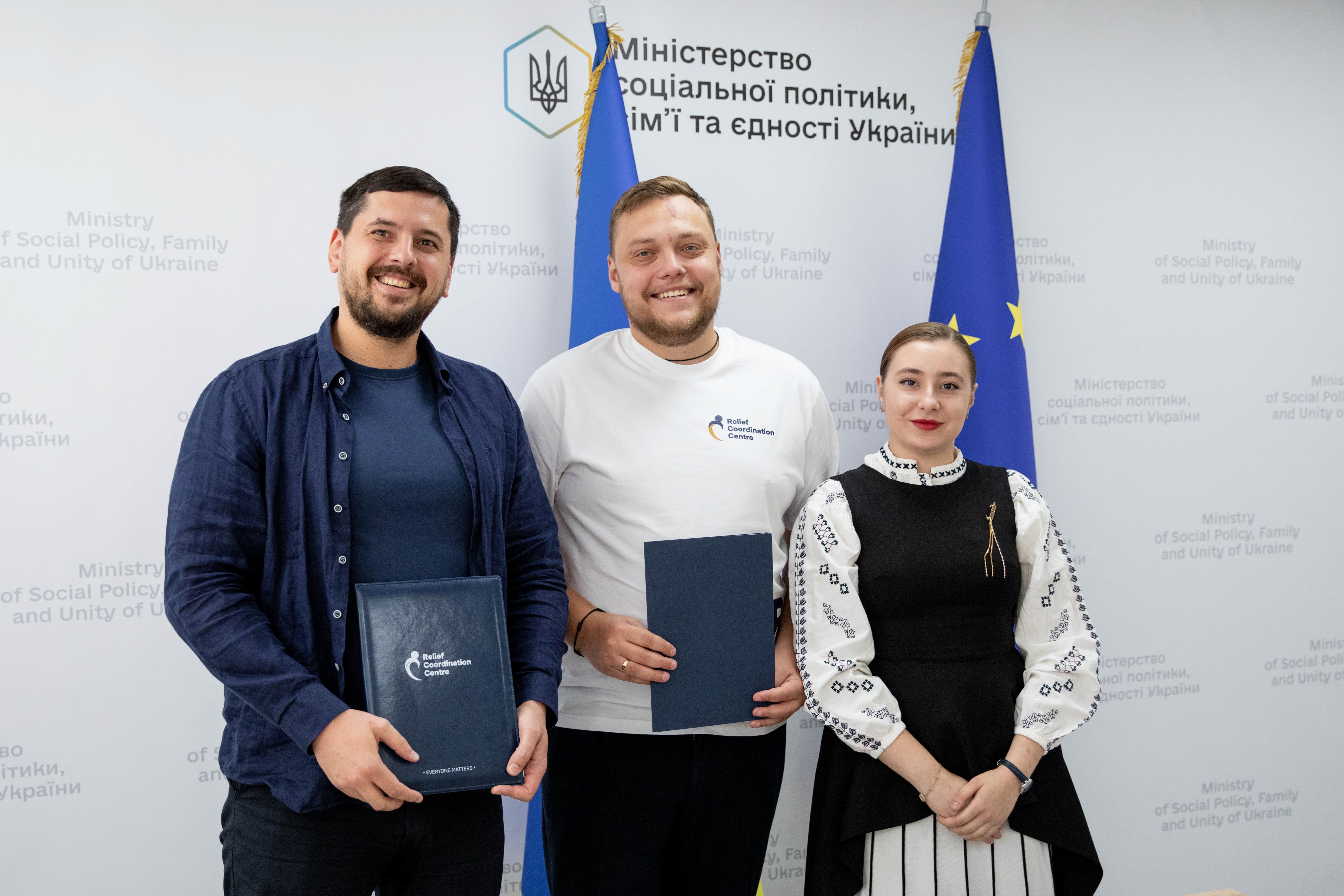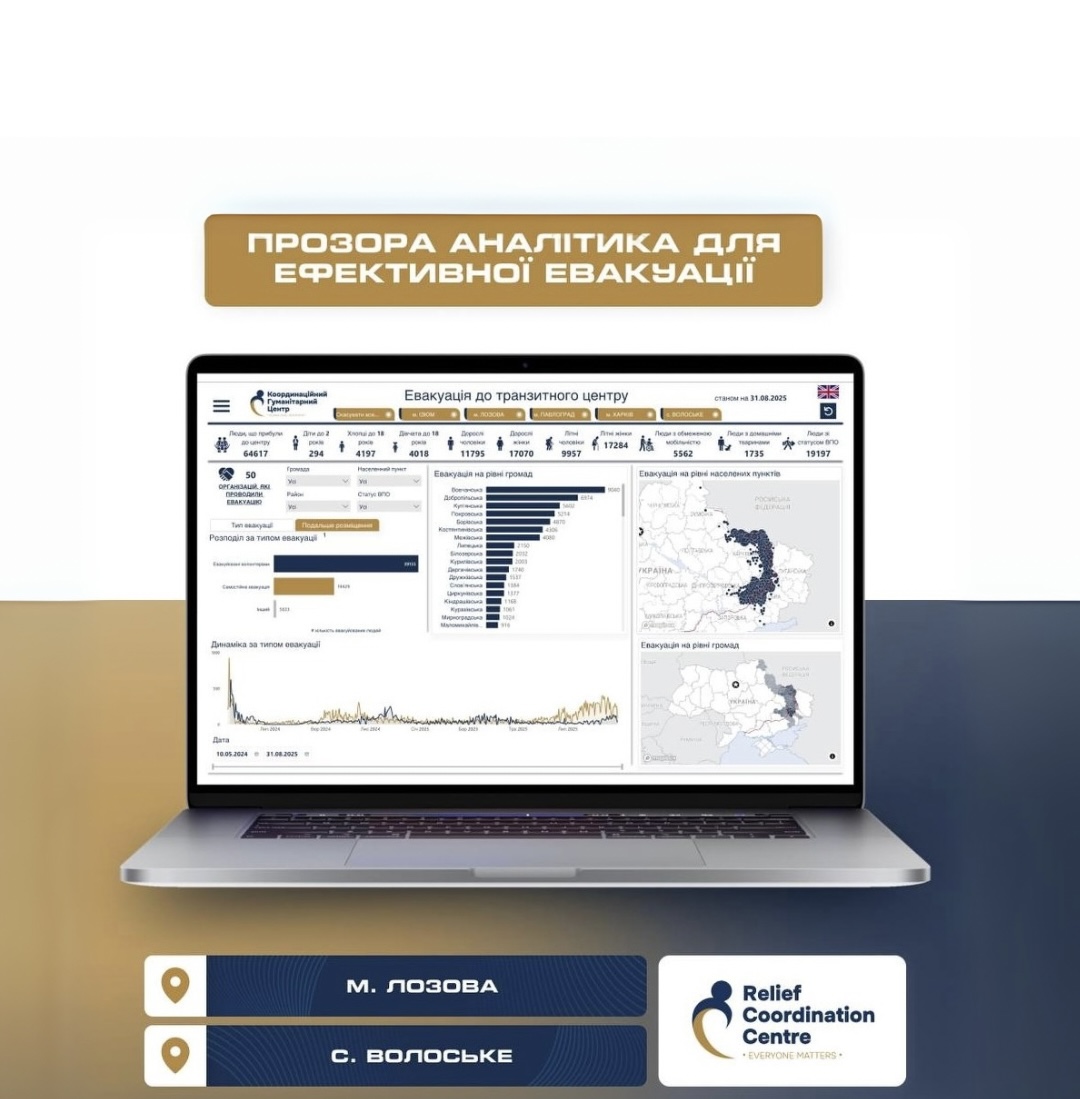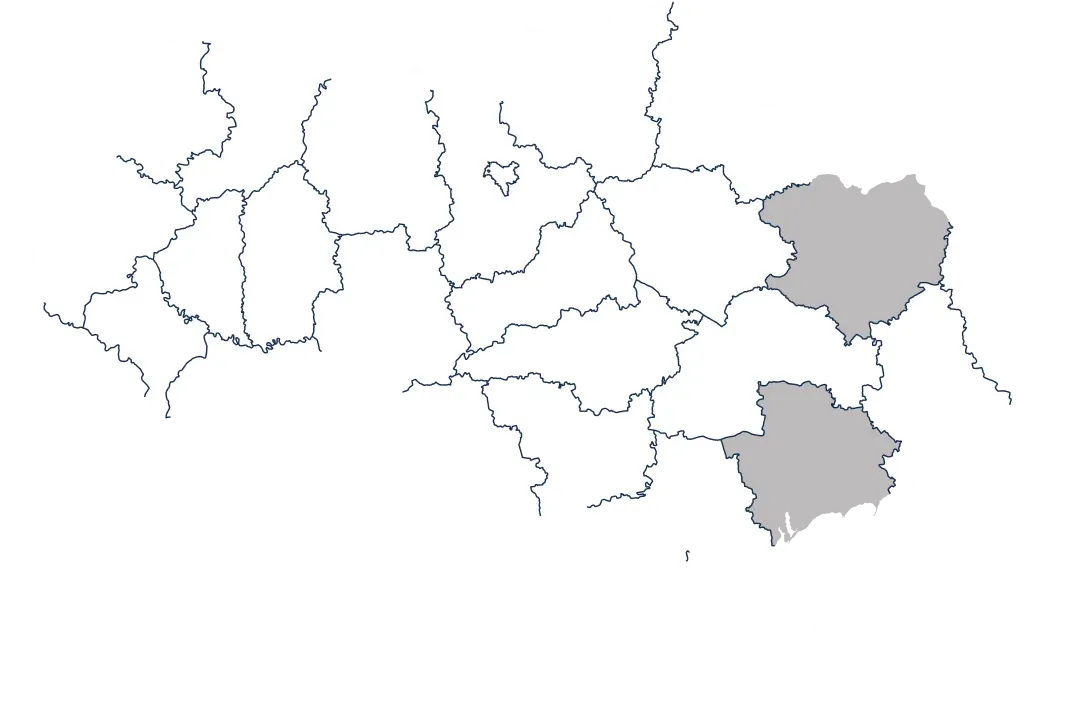Kh
Humanitarian Respond:
+57 883
Evacuees persons
+16 529
Displaced persons
+54 571т
Food aid
+5 780т
Hygienic aid
Our services:
Humanitarian Demining Department
Structural unit responsible for coordinating activities related to the detection, survey, marking, and clearance of territories contaminated with explosive ordnance (EO)
Rapid Response Group
RRG provides coordination and support to local responders, registration, referrals and aid to the affected people, organizes conservation of damaged buildings
Sustainable Settlement Assessment
SSA includes 8 criteria: descriptive part of the settlement, demographic and security indicators, logistics component, urban infrastructure, social infrastructure, market structure, recovery, civil protection.
Interactive map of the humanitarian aid delivered
2800+ settlements in Kharkiv and Zaporizhzhia regions
RCC news:

The Ministry of Social Policy, Family and Unity of Ukraine together with the Charitable Organization Relief Coordination Centre (RCC), have signed a Memorandum of Cooperation. The key goal is to develop a partnership and use the analytical data from the RCC to coordinate evacuation processes in eastern Ukraine. The collaboration will include: Providing the Ministry with up-to-date information on the dynamics of evacuation at Transit Centers. Using analytical data to make timely management decisions. Strengthening coordination between government structures and humanitarian organizations. The response from the state and the charitable sector to the biggest challenge of the war: mass evacuations Today, Ukraine is facing one of its most serious challenges, with a significant increase in evacuation dynamics in the East. Every day, thousands of people are forced to leave their homes due to military actions and danger. The greatest pain and concern for these people is uncertainty, as they don’t know where they will be able to stay, who will support them in the first days, and whether they will be left alone with their vulnerability. This partnership should become a new stage in the development of a systematic approach to supporting people forced to leave their homes, as well as a milestone for the entire charitable sector in Ukraine. Yevhen Koliada, who chairs the Relief Coordination Centre, explained the organization’s main goal, stating: Our main mission is to help those who are forced to evacuate. And our main task is to help the state and the international humanitarian community make the evacuation process fast, safe, and dignified. We want every person who has been forced to leave their home to receive not only a sense of support but also confidence in tomorrow. This is why we are also developing digital solutions that have already proven their effectiveness and help to improve the coordination of evacuation missions, bringing together the efforts of the state, the humanitarian sector, and international partners. Reference: The Charitable Organization Relief Coordination Centre The organization focuses on coordinating and harmonizing the actions of humanitarian missions and organizations in Ukraine. The RCC team, in partnership with Renome Smart, is developing unique digital tools for the charitable sector. The organization's main resource is up-to-date analytical information that helps daily: Distribute donor resources effectively. Avoid duplication of aid. Ensure a timely response to people's needs. Through this work, the RCC is establishing new standards of coordination in Ukraine's charitable sector, increasing the transparency, responsiveness, and effectiveness of humanitarian support.
The Ministry of Social Policy, Family and Unity of Ukraine together with the Charitable Organization Relief Coordination Centre (RCC), have signed a Memorandum of Cooperation. The key goal is to develop a partnership and use the analytical data from the RCC to coordinate evacuation processes in eastern Ukraine.
The collaboration will include:
Providing the Ministry with up-to-date information on the dynamics of evacuation at Transit Centers.
Using analytical data to make timely management decisions.
Strengthening coordination between government structures and humanitarian organizations.
The response from the state and the charitable sector to the biggest challenge of the war: mass evacuations
Today, Ukraine is facing one of its most serious challenges, with a significant increase in evacuation dynamics in the East. Every day, thousands of people are forced to leave their homes due to military actions and danger. The greatest pain and concern for these people is uncertainty, as they don’t know where they will be able to stay, who will support them in the first days, and whether they will be left alone with their vulnerability. This partnership should become a new stage in the development of a systematic approach to supporting people forced to leave their homes, as well as a milestone for the entire charitable sector in Ukraine.
Yevhen Koliada, who chairs the Relief Coordination Centre, explained the organization’s main goal, stating:
Our main mission is to help those who are forced to evacuate. And our main task is to help the state and the international humanitarian community make the evacuation process fast, safe, and dignified. We want every person who has been forced to leave their home to receive not only a sense of support but also confidence in tomorrow. This is why we are also developing digital solutions that have already proven their effectiveness and help to improve the coordination of evacuation missions, bringing together the efforts of the state, the humanitarian sector, and international partners.
Reference: The Charitable Organization Relief Coordination Centre
The organization focuses on coordinating and harmonizing the actions of humanitarian missions and organizations in Ukraine. The RCC team, in partnership with Renome Smart, is developing unique digital tools for the charitable sector. The organization's main resource is up-to-date analytical information that helps daily:
Distribute donor resources effectively.
Avoid duplication of aid.
Ensure a timely response to people's needs.
Through this work, the RCC is establishing new standards of coordination in Ukraine's charitable sector, increasing the transparency, responsiveness, and effectiveness of humanitarian support.
11.09.2025

Updated Transit Centers Dashboard: New Locations and Enhanced Opportunities for Coordination
The Charity Organization Relief Coordination Centre has presented an updated version of the Transit Centers Dashboard, which now includes two new locations: Lozova and Voloske.
This tool was developed to provide humanitarian organizations and international partners with comprehensive and up-to-date information on the needs and pace of evacuation. The dashboard enables users to:
analyze the dynamics of population displacement from frontline areas;
make faster decisions and allocate resources more efficiently;
ensure transparent coordination among all involved organizations.
The updated analytics support better planning of humanitarian assistance and allow for a rapid response to emerging challenges, making the aid process more systematic and effective.
02.09.2025
Official: Independent Relief Coordination Centre - Switzerland Association Registered
In July 2025, Relief Coordination Centre – Switzerland, an independent association, was officially registered in Zurich.
What are the strategic objectives of RCC–Switzerland?
The purpose of establishing RCC–Switzerland is to strengthen interaction with international partners, attract and mobilize additional financial, technical, and expert resources, and expand and integrate Ukrainian humanitarian expertise into global international communities. The Association will focus on supporting key areas of humanitarian activity in Ukraine:
Evacuation of civilians from dangerous regions of Ukraine.
Multi-sectoral support for the population after missile attacks.
Assistance to communities in meeting basic needs.
Psychological support for the affected population.
Implementation of protection and education programs for children affected by the war.
Psychosocial support and rehabilitation for veterans and volunteers.
Community recovery and development.
Humanitarian demining.
What will be of primary importance for the Organization?
The main focus of the Association's activities will be on forming sustainable partnerships with international and local structures, as well as private businesses. RCC–Switzerland will also work to raise the international community's awareness of the humanitarian situation in Ukraine and the current needs of the affected population. All initiatives will be implemented in close coordination with the main office of the Relief Coordination Centre in Ukraine, as well as in cooperation with the Organization's Board and Supervisory Board.
"We consider the creation of RCC–Switzerland a strategically important step to enhance the effectiveness of the humanitarian response and to form long-term solutions aimed at developing Ukraine's charitable sector. This, in turn, will contribute to the country's sustainable recovery. We express our sincere gratitude to all partners, experts, and colleagues who contributed to the creation of this initiative. The Association will work on an ongoing basis to strengthen the capacity of Ukrainian humanitarian organizations and develop international cooperation," said Yevhen Koliada, Chairman of the Board of the CO Relief Coordination Centre.
31.07.2025

















